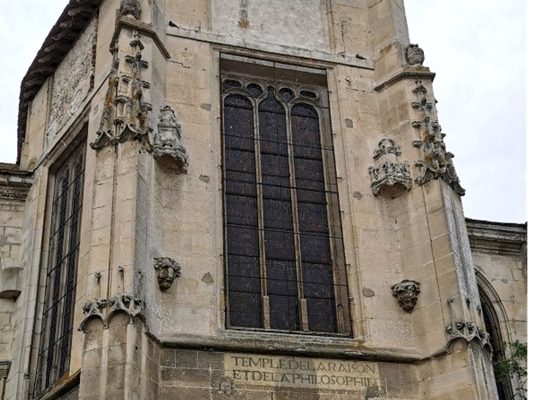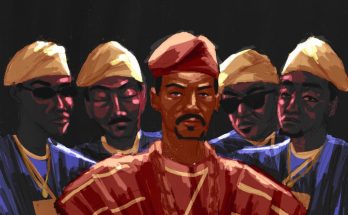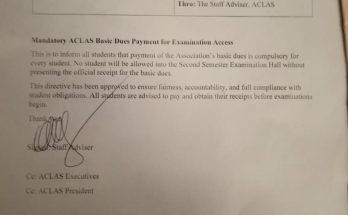PHOTO CREDIT: Temple of Reason: Wikipedia
By: Oluwabukola Odusanya
Think of one thing that makes your belief system, something that is an important part of your identity and let us unravel it. Was it integrated with you at birth, or did you pick it up from a loved one, or the experiences of people around you, to what degree exactly do environmental influences reflect in our choice?
Kinship and community were discovered by our primordial ancestors as a way to survive in the world of hunting and gathering. As we moved progressively into subsistence farming, labour became a necessity, and so did the need to implement concrete structures that allow for quicker and more efficient means of social integration based on the human needs of this period.
Today we see this web of social interactions existing in a complicated tight string, so thin you can easily miss it, but following the same patterns.
For a child born to a middle-class family in Nigeria, life would possibly span out as follows: go to primary and secondary school, enter into a tertiary institution, and then find a decent-paying job while one continues to make ends meet through the various economic and political upheavals of their time.
If there is a change along the line it is usually never based on luck or mere happenstance. It is usually a conscious decision based on observing customs and practices and trying to break free from them. We often tend to neglect how much our external realities can influence our subconscious, so before we proceed let’s perform this exercise again, how much of your thoughts are truly and originally yours?
The manifesto of the cult of reason.
Reason: the power of the mind to think, understand, and form judgements logically.
The parlance cult of reason emerged during a monumental part of human history the French revolution, and it aimed to
erase the focus on Christianity and place emphasis on liberty and reason. Did it mean people were incapable of thinking? And can one even practice religion without reason?
Reason stands firmly in contrast to feelings, emotions and sentiments, which is exactly what religion embodies because man through time has mystified the things that he cannot explain.
Therefore it is not out of place that behind the French revolution was the belief that Christianity was based on values that did not always correlate with the realities of the world, and more importantly, it allowed the reign of tyranny.
The power of religion in their society mostly manifested as myths that held back societal progress and inquiry; if you believe that the earth is flat, there would be places you would never dream of reaching. If you also believe that you can only gather rewards in heaven, acquiring personal properties on earth would not seem so logical. Through the belief in reward and punishment and the preaching of asceticism, the lower class would meekly accept its social condition as God’s will and the higher class would continue to thrive.
Once the west was able to free itself from the hold of religion and relate to the material world, just as it is, without a melancholy longing for utopia they began to surge ahead, expanding in the knowledge of the world around them, and exploring into Africa and the far east.
“The Ethiopians make their gods black-haired and flat-nosed, and the Thracians make theirs red-haired and blue-eyed.” “Yes,” he added, “and if the beasts had hands and could paint and carve, the horses would make their gods like horses, and the oxen make theirs like oxen.”- Xenophanes.
The wisdom of the old ways.
Now let’s go to Africa which has been exposed to many influences from the far east and the west. Before we were sold all these various ideologies, we have to stress that we did have our religion.
Nigerian traditional religion had such a mystified sacredness to it that social vices were almost uncommon. It was a closely knit system that stressed the value of community, love and respect for one’s neighbour. Different oracles, folklores cult, masquerades, practices and rituals like swearing oaths tied a community together, and it was unusual for people to stray far away from the community, as survival was only secure within the construct of family and society.
Fast-forward to the colonial era where we have been sold these new religions, with no significant changes upon closer Inspection except for the mediator. This new religion argued in favour of delayed retributions, a God more merciful and gracious, more interested in the details of the individual, and the God who stood for justice and brightness slowly began to disintegrate.
We can easily agree that spirituality takes a more direct approach between man and his object of inquiry, while religion reinforces community, both the traditional and acculturated religion sought to cover these areas. we can factually ascertain that the tradition emerged to suit and cover the temperament of the black man, while a lot of controversies surround the incursion of the West, why do you free yourself from the bondage of religion and in the same breadth recommend it for another?
…There has also been a remarkable change in moral values all over the land. Western influence has not been altogether beneficial to the people. The people have been taught too many things! Pax Britannica makes it possible for a daylight burglar to escape his well-merited punishment if he and his lawyers are sufficiently clever about it . .. Christianity, by a marriage of purpose, makes its contribution to the detrimental changes in moral values, some hold it has replaced the old fear of the divinities with the relieving but harmful notion of God who is a sentimental old man, ever ready to forgive. So also does Islam unwittingly create the erroneous impression that the fulfilment of the obligatory duties and acts of penance by good works is sufficient for winning heaven? The result of all these is that our enlightened products of the two fashionable religions can now steal without any twinge of moral compunction those articles of food placed for sale at crossroads which used to be quite safe. They can break covenants or promises made on oath, with brazen indifference: all these they feel free to do where those who have brought up on the old ways and wisdom still shake and tremble at the mere thought of such things (Idowu)”…
Nigeria and her many bureaucratic traditions.
Today Nigeria is like a younger sibling who only likes to wear her older siblings’ old clothes. It is a society held in chains to globalization, while still stuck in its original communal way of life. A village that has been given phones and the town crier social media, so what we have is a lot of propaganda without any attention to the real problems. Even though we are a conservative society, our lack of insight only bestows upon us a sanctimonious look as there seems to be no real conviction, just stories and affirmations that were recited down to us strengthened by our inability to seek out knowledge and test hypotheses.
Let us apply a little bit of logic to these questions; why would a religion condemn a cultural practice of polygamy which arose as a need to supply subsistence labour, preach the holiness of matrimony between man and woman, then centuries later advocate that love can be expressed beyond gender?
Why should a democratic system be imposed post-colonialism, when data shows that the administration style we were handed was due to lessening the responsibility on the part of the colonialists and not because it was the most adequate? Why would a country so religious be so evil, if we are truly convinced in what we consider our morals and values?
It is almost as if we aged without growing, because how is it that we always advocate thinking within the confines of our superstitions and sentiments? We water down curiosity in children when they ask questions, by either giving them conspiracies instead of factual answers or meekly admitting that the answers are unknown to us. We force young adults to think within the box of these watered-down versions of truth that suits our sentiments recycling the same old patterns but somehow expecting different results.
A man without society is a beast.
Many philosophers believe man has a natural state, that man is naturally inclined to self-preservation. So the default state of man is self, and when a man is in this state, social order and solidarity can’t thrive, as these are values that are based on collective consciousness. Man is such a social creature that usually wrong or right is learnt by association. The evidence for this exists when we look at cultural differentiation, how something that is a norm in one society is considered a vice in another.
We started this conversation by shedding light on the revolution of reason in France, and how advantageous it was to launch the west into an era of achieving great feats, so for a balanced view we should examine the ripple effect of a highly individualistic society.
A lot of Nigeria’s problem arises from poverty and a lack of a structure that grounds its citizens. This is not particularly accurate for first-world countries, which, of course, promotes the focus on self-exploration, and this evokes the pondering question, why would a man who has attained this level of liberation be leaning towards a natural state of chaos?
We can therefore conclude that the heightened state of self in man would not necessarily eradicate societal vices.
“Gun violence is a major problem in America, particularly in the United States. According to the Centers for Disease Control and Prevention (CDC), there were over 43,000 gun deaths in the United States in 2019, making it the leading cause of death for young people aged 15-24.”
In all our gettings, let us get knowledge.
At the end of the conspiracies and theories, there is no ultimate truth in any of this, there are only facts that can prove a certain truth.
Neither is there a ‘one size fits all’ for any of us. If everyone who refuses to see through our lenses is considered as bad, then we are In a condition where everyone is in a deep mistrust of one another.
The intent for exploring this inquiry is not to dictate what is right or wrong, but to explore all the areas in between that show the complexities of the human mind.
That it is within human reason and judgment to believe in a deity, simultaneously as it is within human reason to question the world to form our worldviews. It is within human reason to allow change because the entire universe operates on the principle of change. We must find viable ways of introspection, and step away from the cult of community that has protected us for so long.
If God’s mandate according to the two dominant religions in Nigeria advocates for us to be fruitful and multiply, and the spectrum of fruitfulness according to the laws of this material world pertains to growth, would it not be that to oppose change is to resist God?




